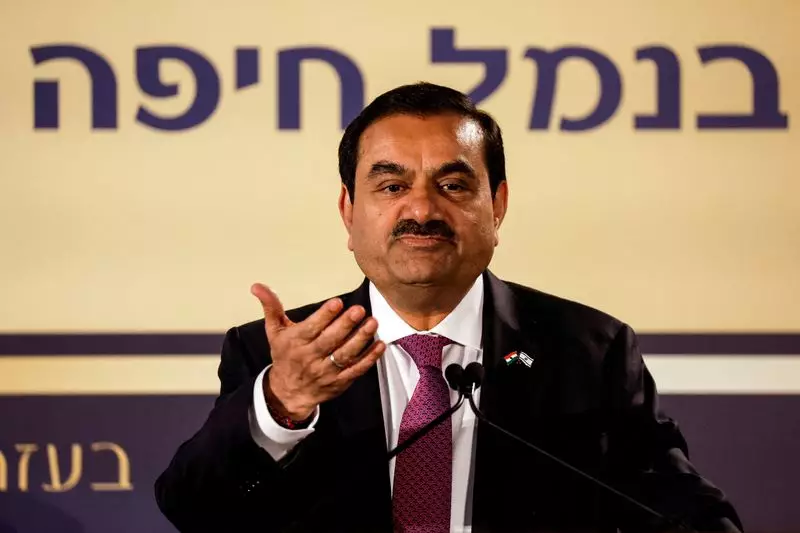In a significant turn of events that has caught global attention, Gautam Adani, the billionaire chairman of the Adani Group, has been indicted in the United States for his alleged involvement in a massive bribery and fraud scheme. The implications of this case are profound, not only due to Adani’s immense wealth—estimated at $69.8 billion, making him the world’s 22nd richest individual—but also because of the serious allegations involving corruption and deceit in securing lucrative contracts in India. This development raises critical questions about corporate governance, accountability, and the ethical standards that govern multinational operations.
The U.S. prosecutors have detailed that Adani, along with seven other defendants—his nephew Sagar Adani among them—are implicated in supposedly funneling around $265 million in bribes to Indian government officials. This shady deal was allegedly orchestrated to manipulate contracts pertaining to solar energy, an industry considered vital for sustainable development. It is projected that these contracts could yield a staggering $2 billion in profits over the next two decades. What makes this scenario even more alarming is the revelation that the conspirators reportedly referred to Gautam Adani using clandestine nicknames like “Numero uno” and “the big man,” suggesting a well-planned conspiracy.
This revelation shines a light on the troubling dynamics often at play in high-stakes business environments where ethical lines can easily be blurred under the pressure to maximize profits. Financial experts and corporate analysts are left questioning how such significant actions could potentially go unnoticed for an extended period, raising red flags over the transparency—or lack thereof—in major business transactions.
As the case unfolds, it becomes apparent that the extent of the corruption stretched further than just Adani and his immediate circle. The indictment points to the involvement of several high-ranking officials at both Adani Green Energy and Azure Power Global. These individuals, including former executives Ranjit Gupta and Rupesh Agarwal, orchestrated a concerted effort to conceal their corrupt practices from investors and lenders, effectively raising over $3 billion in loans and bonds under false pretenses. This pattern of deceit is reminiscent of other high-profile business scandals, where corporate giants exploited regulatory loopholes, thereby enriching themselves at the expense of ethical standards.
Furthermore, the prosecutorial actions indicate a violation of the Foreign Corrupt Practices Act—an essential anti-bribery law in the United States—which holds both foreign and domestic entities accountable for corrupt activities. This highlights not only the legal ramifications that Adani and his co-defendants may face but also reinforces the U.S. commitment to tackling global corruption, especially involving multinational corporations.
In response to the allegations, arrest warrants have been issued for both Gautam and Sagar Adani, with U.S. authorities planning to collaborate with international law enforcement to enforce these warrants. This step may lead to an intricate legal battle, as the defendants navigate the complicated waters of international law and the criminal justice system. The involvement of prominent figures in this indictment poses a threat to the credibility of numerous entities, as potential investors and stakeholders now may view the Adani Group with skepticism.
The broader implications of this scandal resonate through the corridors of economic power, particularly in India. As one of the largest conglomerates in the country, the Adani Group’s standing has been significantly compromised, prompting calls for enhanced regulatory scrutiny of similar businesses. The case highlights the urgent need for stronger governance and more stringent ethical guidelines to safeguard against potential abuses in the future.
Responding to the turmoil, Gurgaon-based Adani Group has refrained from commenting outside of business hours, indicating that such a high-profile indictment likely requires a strategic and carefully crafted approach to public relations. Moreover, just before the charges were disclosed, Gautam Adani announced intentions to invest $10 billion in U.S. energy security and infrastructure projects, a move that could be perceived as an attempt to showcase resilience amidst controversy. However, skepticism remains among investors and analysts regarding the credibility of such commitments in light of the recent developments.
The ramifications of Gautam Adani’s indictment extend beyond his personal fortunes—they challenge the integrity of corporate governance frameworks worldwide and spotlight the vast potential for corruption within substantial business operations. As investigations deepen and more information surfaces, the global business community must rally to reinforce ethical standards that prioritize transparency and accountability, thereby safeguarding against the corrupt practices that have plagued numerous industries. In this pivotal moment, stakeholders must remain vigilant in advocating for integrity, ensuring a fair and equitable environment for all participants in the marketplace.

